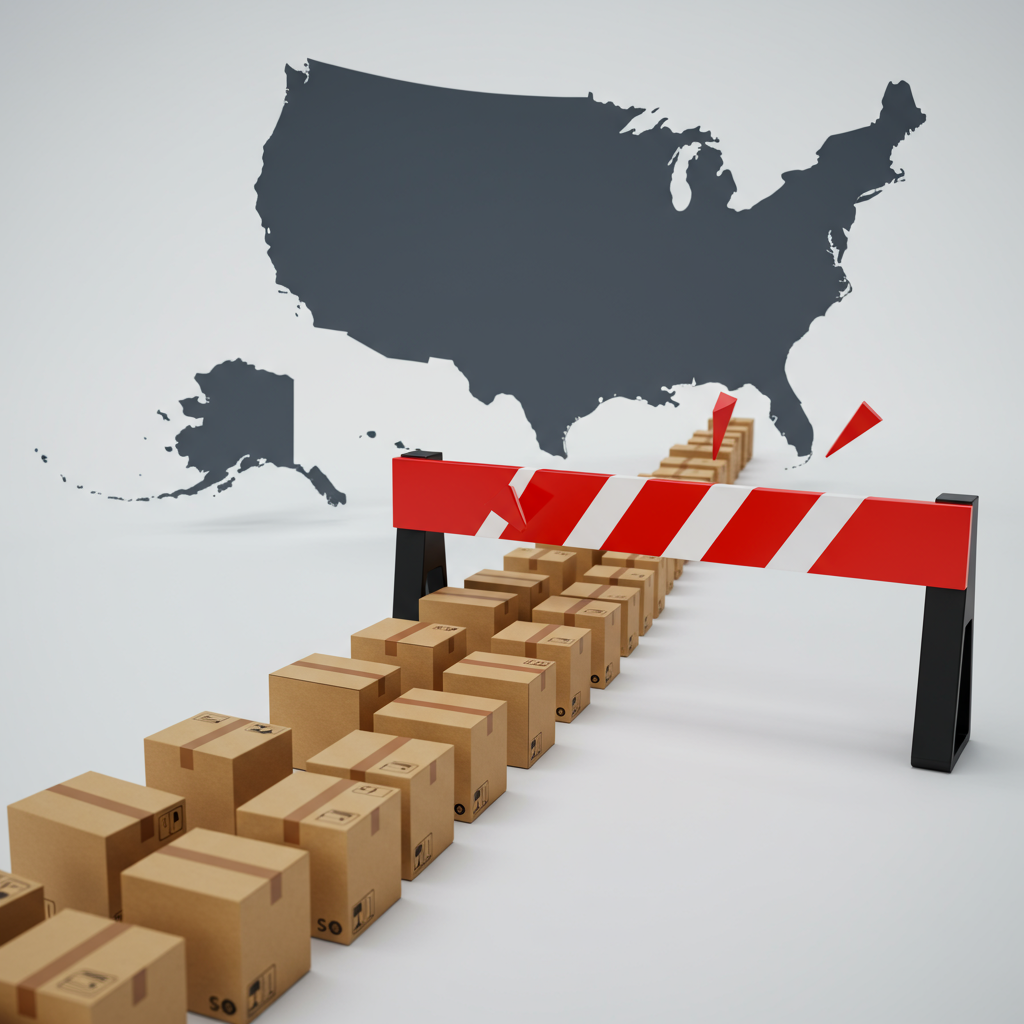The landscape of international commerce is undergoing a significant shake-up, profoundly impacting how goods flow between Europe and the United States. In a move sending ripples through global supply chains, several major European postal agencies have begun to pause or completely halt shipments to the U.S. This critical decision stems from the impending end of a long-standing “de minimis” tariff exemption this week, injecting considerable uncertainty into cross-border trade. American consumers and small businesses, accustomed to seamless access to a world of goods, now face potential delays, increased costs, and widespread disruption to international shipping.
The End of an Era: Understanding the De Minimis Exemption
For years, the de minimis exemption served as a cornerstone for low-value cross-border trade. This policy allowed packages valued at $800 or less to enter the U.S. without incurring tariffs or extensive customs scrutiny. Its primary purpose was to streamline international shipping, facilitate small-dollar commerce, and simplify gift-giving across borders. However, in late July, the U.S. administration formally revoked this exemption, with its full termination set for August 29. This means that virtually all incoming packages, regardless of their value, are now subject to the full spectrum of US tariffs and customs procedures. The implications for everyday consumers and agile e-commerce businesses are substantial, potentially grinding a significant portion of European parcels to a halt.
Europe’s Immediate Response: A Shipping Blackout
Facing a rapidly approaching deadline and a lack of clear enforcement mechanisms for the new US tariffs, many European carriers have opted for caution. Citing the immense uncertainty surrounding the new rules, these agencies have chosen to temporarily suspend international shipping services to the U.S. This preemptive measure aims to prevent packages from being caught in customs limbo or incurring unexpected charges.
For example, the U.K.’s Royal Mail announced plans to halt its existing shipment services, with intentions to resume only once the new tariff regime is fully operational and understood. This sudden pause illustrates the severe logistical challenges and compliance burdens placed on carriers globally. The decision underscores the difficulty of implementing such sweeping changes in a short timeframe, directly impacting the flow of countless European parcels.
The Wider Net of US Tariffs: A Global Trade Shake-Up
The revocation of the de minimis exemption is not an isolated event but part of a broader, more aggressive trade strategy by the U.S. government. Beyond small packages, US tariffs are now impacting a wide array of goods and international partners.
New Tariff Battlegrounds
Recent announcements highlight the expansive reach of these trade policies:
Furniture Imports: The U.S. is currently investigating furniture imports, with tariffs expected to be imposed within weeks. The stated goal is to repatriate manufacturing to states like North Carolina, South Carolina, and Michigan.
Indian Imports: Punitive US tariffs of 50% on Indian imports are anticipated, doubling by late August, in response to India’s continued purchase of Russian oil. China, notably, has expressed strong opposition to these tariffs, highlighting growing cooperation with India.
US-EU Trade Deal: A finalized trade framework with the EU includes a 15% US tariff on most EU imports, such as autos, pharmaceutical goods, semiconductors, and lumber. Interestingly, wine and spirits were initially excluded, though the EU remains committed to seeking their inclusion in future tariff reduction talks. In return, the EU has committed to removing tariffs on all U.S. industrial goods.
Semiconductors and Copper: Tariffs on semiconductors and copper have also been a focus, with some U.S. manufacturers, like Southwire, praising copper tariffs for benefiting American companies.
These multifaceted US tariffs demonstrate a concerted effort to reshape global trade dynamics, with significant implications for international shipping and supply chains worldwide.
Economic Ripples: From Inflation to Retail Shock
The economic fallout from these aggressive trade policies is becoming increasingly evident, touching every level from global markets to the consumer’s pocketbook.
Inflationary Pressures Mount
Federal Reserve Chair Jerome Powell has explicitly stated that the effects of US tariffs on consumer prices are “now clearly visible,” and are expected to accumulate over time. While the Fed initially hoped for a “one-time shift in the price level,” there’s a growing risk of a “more lasting inflation dynamic.” This means that the increased import costs are not just a temporary blip but could lead to persistent price hikes across various sectors. The slow arrival of tariff-driven inflation is often attributed to its hidden impact deep within complex global supply chains.
Retailers Brace for Impact
Major retailers are already feeling the pinch. Walmart CEO Doug McMillon noted that while the impact has been “gradual” and consumer behavior “somewhat muted” so far, costs are increasing weekly. He anticipates significant cost increases in the coming quarters as inventory replenishes at post-tariff price levels. Consumers, particularly parents, are experiencing “back-to-school sticker shock” on children’s clothing due to these tariff-induced price hikes. This situation creates a difficult balancing act for retailers striving to keep prices low amidst rising import costs.
Agricultural Sector’s Double Whammy
U.S. farmers are facing severe challenges, grappling with a “double whammy” of the trade war and bumper crops. China, a historically major buyer of U.S. soybeans, has significantly reduced its purchases. This, coupled with large harvests, has driven crop prices to multi-year lows, threatening the livelihoods of many American farmers.
Supply Chain Strain and Industry Adjustments
The broader trade war impact extends to logistics and manufacturing, prompting strategic adjustments across industries.
Global Logistics Disruption
Beyond the initial European postal services, other global carriers, including those in Sweden and Norway, are also ceasing low-cost parcel deliveries to the U.S. This widespread halt for small packages underscores the global nature of the challenge. The sheer volume of packages previously entering the U.S. under de minimis rules—an estimated 1.3 billion last year, with about 60% originating from China—highlights the monumental scale of this international shipping disruption.
Manufacturing and Technology Shifts
Some sectors are reacting with significant investments and strategic pivots:
Pharmaceuticals: Johnson & Johnson announced a $2 billion investment to boost U.S. manufacturing, anticipating impending drug tariffs. This reflects a trend towards reshoring production in response to trade policies.
Tech Sector Tensions: In a high-profile development, Nvidia was instructed to halt production of its H20 AI chip for China. This followed reports that Beijing urged firms to avoid the processor after comments by a U.S. Commerce Secretary that Chinese officials found “insulting.” This move raises concerns about demand for U.S. tech and could further complicate trade talks, with Chinese buyers reportedly shifting to domestic alternatives.
These developments demonstrate how US tariffs are not only affecting European parcels but also shaping the future of global manufacturing and technological competition.
Who Pays the Price? Consumers and Small Businesses
Ultimately, the end of the de minimis exemption and the broader application of US tariffs will significantly impact American consumers and small businesses. Low-price goods from around the world, particularly popular for everyday purchases and gifts, will become more expensive. For small businesses relying on international suppliers or shipping to U.S. customers, the increased import costs and administrative burdens could be prohibitive. This change directly challenges the principles of accessible global e-commerce and could lead to reduced choice and higher prices for consumers. Navigating this new landscape will require careful planning and a deep understanding of evolving trade regulations.
The Road Ahead: Ongoing Trade Negotiations
The current situation is far from settled. The U.S. remains engaged in complex trade negotiations with key partners like Canada, Mexico, and China. These ongoing discussions, alongside the continuous rollout of new tariff policies, signal a dynamic and unpredictable future for global trade. Businesses and consumers alike must remain vigilant and adaptable to the evolving landscape shaped by US tariffs and shifting international relations.
Frequently Asked Questions
What exactly is the de minimis exemption, and why was it revoked?
The de minimis exemption was a U.S. customs rule that allowed packages valued at $800 or less to enter the country without incurring import tariffs or extensive customs procedures. It was designed to simplify international shipping for low-value goods and foster cross-border e-commerce. The Trump administration formally revoked this exemption in late July, with the change taking full effect on August 29. The revocation is part of a broader strategy to impose US tariffs on a wider range of imports, reduce the flow of low-cost foreign goods, and potentially encourage domestic production.
Which European postal services are affected by the new US tariffs on small packages?
Several major European postal agencies have been directly affected and have reacted by pausing or halting international shipping of small packages to the U.S. The U.K.’s Royal Mail is a notable example, having announced a temporary suspension of services. Other global postal services, including those in Sweden and Norway, are also discontinuing low-cost parcel deliveries. These actions stem from the uncertainty surrounding the new US tariffs and the lack of time to establish new compliance mechanisms for packages previously covered by the de minimis exemption.
How will these new US tariffs impact the cost of online shopping from Europe for American consumers?
The new US tariffs, particularly the revocation of the de minimis exemption, will make online shopping from Europe more expensive for American consumers. Goods previously exempt from duties will now incur import costs, which will likely be passed on to the consumer. Retailers like Walmart have already noted increasing costs as inventory replenishes under the new tariff regime, leading to “sticker shock” for some items. This means that items historically purchased from European parcels, especially low-priced goods and gifts, will see price increases, reducing affordability and potentially altering consumer purchasing habits for cross-border e-commerce.




